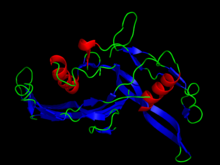激活素與抑制素
外觀
| 抑制素,α | |
|---|---|
| 識別 | |
| 符號 | INHA |
| Entrez | 3623 |
| HUGO | 6065 |
| OMIM | 147380 |
| RefSeq | NM_002191 |
| UniProt | P05111 |
| 其他資料 | |
| 基因座 | 2 q33-qter |
| 抑制素,βA | |
|---|---|

| |
| The Activin dimer, from 2ARV.pdb | |
| 識別 | |
| 符號 | INHBA |
| 替換符號 | activin A |
| Entrez | 3624 |
| HUGO | 6066 |
| OMIM | 147290 |
| RefSeq | NM_002192 |
| UniProt | P08476 |
| 其他資料 | |
| 基因座 | 7 p15-p13 |
| 抑制素,βB | |
|---|---|
| 識別 | |
| 符號 | INHBB |
| 替換符號 | activin B |
| Entrez | 3625 |
| HUGO | 6067 |
| OMIM | 147390 |
| RefSeq | NM_002193 |
| UniProt | P09529 |
| 其他資料 | |
| 基因座 | 2 cen-q13 |
| 抑制素,βC | |
|---|---|
| 識別 | |
| 符號 | INHBC |
| 替換符號 | activin C |
| Entrez | 3626 |
| HUGO | 6068 |
| OMIM | 601233 |
| RefSeq | NM_005538 |
| UniProt | P55103 |
| 其他資料 | |
| 基因座 | 12 q13 |
| 抑制素,βE | |
|---|---|
| 識別 | |
| 符號 | INHBE |
| 替換符號 | activin E |
| Entrez | 83729 |
| HUGO | 24029 |
| OMIM | 612031 |
| RefSeq | NM_031479 |
| UniProt | P58166 |
| 其他資料 | |
| 基因座 | 12 q13.2 |
激活素(英語:Activin,亦成為激活蛋白或活化素)與抑制素(英語:inhibin)是一種用於抑制卵泡刺激素分泌與組合的梭氨酸[1] 。參與在月經周期的調節中。
結構
[編輯]抑制素屬於轉化生長因子-β超家族,由二硫鍵鏈接起來的α和β亞單位組成。兩種抑制素的β亞單位不同,儘管α亞單位相同。
抑制素
[編輯]女性
[編輯]在女性卵巢中,卵泡刺激素刺激卵泡中粒層細胞的抑制素分泌,隨之使卵泡刺激素水平下降,形成負反饋。促性腺激素釋放激素(GnRH)降低抑制素的分泌,胰島素樣生長因子-1(IGF-1)則可以促進其分泌。
男性
[編輯]在男性中,同樣可以抑制卵泡刺激素分泌,由位於睾丸的細精管中的塞爾托利氏細胞分泌[2]。
活化素
[編輯]活化素是與抑制素完全相反的一種縮氨酸。
臨床重要性
[編輯]在嬰兒出生前的四屏測試,抑制素A在孕婦懷孕16-18周的時候可以被檢測到。高升的抑制素(連同增加的β-人體絨膜促性腺激素,降低的甲胎蛋白,和降低的雌三醇) [3] 可能導致胎兒的唐氏綜合徵。但四屏測試若得到異常結果一般需要進一步驗證。它也是一種患卵巢癌的腫瘤標誌[4][5]。
參考資料
[編輯]- ^ van Zonneveld P, Scheffer G, Broekmans F, Blankenstein M, de Jong F, Looman C, Habbema J, te Velde E. Do cycle disturbances explain the age-related decline of female fertility? Cycle characteristics of women aged over 40 years compared with a reference population of young women. Hum Reprod. 2003, 18 (3): 495–501. PMID 12615813.
- ^ Skinner M, McLachlan R, Bremner W. Stimulation of Sertoli cell inhibin secretion by the testicular paracrine factor PModS. Mol Cell Endocrinol. 1989, 66 (2): 239–49. PMID 2515083.
- ^ Aitken D, Wallace E, Crossley J, Swanston I, van Pareren Y, van Maarle M, Groome N, Macri J, Connor J. Dimeric inhibin A as a marker for Down's syndrome in early pregnancy. N Engl J Med. 1996, 334 (19): 1231–6 [2007-05-15]. PMID 8606718. (原始內容存檔於2008-01-08).
- ^ Robertson D, Pruysers E, Jobling T. Inhibin as a diagnostic marker for ovarian cancer. Cancer Lett. PMID 17320281.
- ^ Robertson D, Pruysers E, Burger H, Jobling T, McNeilage J, Healy D. Inhibins and ovarian cancer. Mol Cell Endocrinol. 2004, 225 (1-2): 65–71. PMID 15451569.
